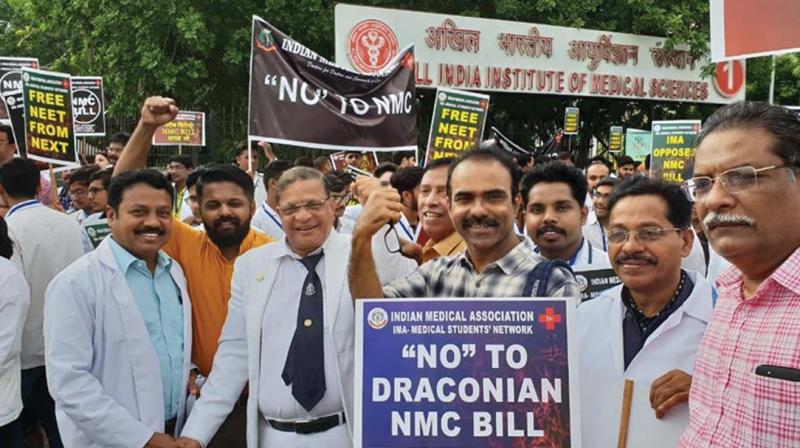Not by the law alone
The Lok Sabha has passed the National Medical Council Bill to replace the tainted Medical Council of India.

The Lok Sabha may have passed the National Medical Commission (NMC) Bill but the opposition to the legislation is growing across the country including Kerala as the piece of legislation raises serious concerns about its adverse impact on the medical sector.
The doctors’ associations allege that the main issue is the move to facilitate the entry of people into the medical profession through the backdoor. “The Centre has decided to grant license to people even without the basic MBBS qualification. Such people will now be allowed to practice modern medicine,” said Indian Medical Association (IMA) state president N. Sulphi.
The doctors point their fingers at the provision to grant ‘limited licence’ to practice medicine at mid-level as community health provider to persons connected with modern scientific medical profession.
As per the bill, the community health providers can prescribe specified medicine independently in primary and preventive healthcare. But in cases other than primary and preventive healthcare, they can prescribe medicine only under the supervision of registered medical practitioners.
According to medical associations, ‘persons connected with modern scientific medical profession’ are not qualified to handle the work of doctors. The doctors during and after their MBBS course get continuous and comprehensive training, they point out.
As per Section 32, anybody connected with modern medicine will be given license to practice. Thou gh the government has not defined which are these sections, the IMA suspects that physiotherapists, pharmacists and optometrist are likely to be included.
The move is to allow entry of these sections into the register of MBBS doctors, they say.
The proposal is a clear encroachment into the domain of modern medicine doctors. “Untrained doctors are not just a threat to the medical institutions but also to the poor patients seeking treatment there,” said Dr Sulphi. “We have a strength of 30,000 doctors in Kerala. Of these a majority will take part in the nationwide strike on Wednesday.”
The bill was originally introduced in Parliament in 2017. Following nationwide protests, the government had invited suggestions from various stakeholders and held discussions with the representatives of various organisations. The IMA and organisations had a series of meetings with parliamentary standing committee on the NMC Bill.
However, two years down the line the doctors say that the revised Bill passed in the Lok Sabha has failed to address the concerns raised by the medical fraternity.
Planning Board member Dr B. Ekbal says the Bill is not at all democratic in its character and composition. The new set up is more of a bureaucratic centralised control system which is very hierarchical. The presence of professionals is very much limited.
While admitting that the existing MCI system has its own limitations, he said instead of finding solution to the problems they have come out with anti-democratic proposals. Most of the suggestions put forward by various stakeholders have not been taken into consideration while framing the new legislation.
Doctors say replacing a 150-member strong elected body like Indian Medical Council with a fully nominated 25 member panel is unacceptable in a democratic set up. Nearly 40 per cent of members proposed in new commission would be persons who have nothing to do with medical profession.
KGMOA which is the largest association of government doctors in Kerala suspects that the agenda of NMC was to bring in indigenous medicine in an inappropriate way by diluting and controlling modern medicine.
This, they allege, would destroy the existing modern medicine sector. The idea to take on board people from Indian System of Medicine with the objective of strengthening manpower in rural and remote areas is totally unacceptable.
The doctors’ organisations believe that these proposals will make medical education more expensive in the country depriving the lower socio-economic groups of quality education.
The Kerala Government Medical College Teachers Association (KGMCTA) which represents the medical college doctors in the state, has expressed solidarity with the nationwide strike. “Since ours is a service organisation we cannot go on a flash strike. We have to give sufficient notice to the government. However, our full support is with the organisations which are organising the protest,” said KGMCTA state president Dr Suresh Babu.
The medical students are also opposed to NMC. They are specifically opposed to the provision to merge NEXT with the National Eligibility cum Entrance Test and also the powers vested with NMC to regulate fees for 50 per cent seats in private medical colleges and deemed universities.
The students are also up in arms against the Commission because of the anti-student proposals. After completing MBBS by taking 20 to 25 exams in 5.5 years, a person becomes a medical graduate. But the NMC proposal says it's not enough; the doctor will have to take another examination.
Another major proposal of the NMC Bill has been the scrapping of NEET PG exam, and introduction of NEXT which would double up as an entrance test for PG medical and dental courses.
As per the amendments made in the fresh NMC Bill, entry into the PG programmes will be on the basis of the results of NEXT which would be held as a common exam across the country.
The doctors' organisations hope that the bill will not make its way through the Rajya Sabha as there was widespread opposition.

